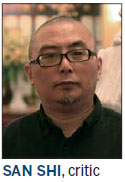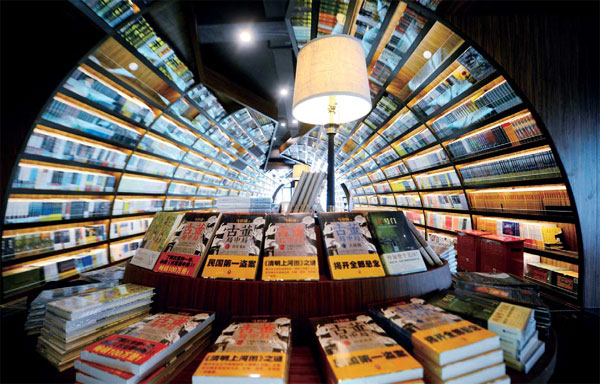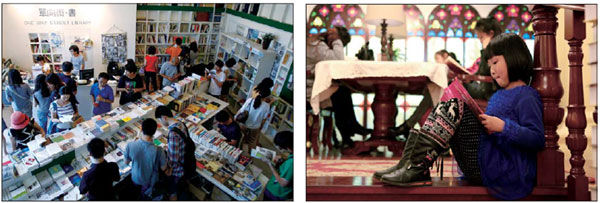Scripting a new chapter

Bookshop owners are trying many things to keep their businesses alive, from revamping their appearance to seeking government support
San Shi has finally found his calling - upgrading China's struggling bookstores. He has worked miracles with the bookstores he has worked on, to the extent of making them tourist attractions.
San Shi, whose real name is Zhang Lei, has worked in publishing, in the media and as a pop music critic, and now is recognized as an expert on reviving bookstores. Since 2014, he has transformed six of them. (He says he is better known in the business by his sobriquet, meaning "three stones", which is a play on words of his name in Chinese.)
| Zhong Shu Ge in Yangzhou, Jiangsu province, attracts readers with its wide collection and modern decor. Meng Delong / For China Daily |
| Left: one way street library has grown into a hot spot in Beijing's cultural scene. Zhu Xingxin / China Daily; right: Gogol bookstore in Harbin, Heilongjiang province, is designed in a European style. Zhang Shu / CFP |
Among his successes is Gogol Bookstore in Harbin, the capital of Heilongjiang province, which he transformed into a European-style outlet after studying the city's culture and history.
He also changed Xinhua Bookstore, a state-run chain store in Jinggangshan, Jiangxi province, into Red Bookstore, focusing on revolution-themed books, as the city is known for its revolutionary history.
"All six stores are making a profit," San Shi tells China Daily. "Seeing readers enjoying themselves at the bookstores, I feel satisfied. My secret is that bookstores should not be confined to selling books. They have to be creative and seize a special feature to become a place or venue for multiple cultural events."
It seems that San Shi's expertise is just what is needed now, as the State Administration of Press, Publication, Radio, Film and Television in June joined 10 ministries in releasing guidelines to support bookstores in the country.
Recently, the administration also held a conference with representatives from the ministries, heads of its local branches and bookstore owners to discuss how to implement the guidelines.
"The guidelines are unprecedented and the most detailed I've seen for 30 years, and have practical suggestions," says San Shi.
The guidelines call for more 24-hour bookstores, suggest ways to increase the number of bookstores to meet both urban and rural needs, and urge bookstores to use the internet to offer a print-on-demand service.
The guidelines also say the ministries will work together to offer favorable tax policies, special funds and reduced rents.
Explaining the trend, Cai Fuchao, head of the State Administration of Press, Publication, Radio, Film and Television, says: "Rents were rising and people were buying books online."

San Shi says he has noticed a revival in the bookstore business since 2014. He adds there are more people reading now.
Zhang Zuozhen, general manager of Joint Publishing Bookstores, says his store switched to 24-hour operations in 2014, and not only did this earn praise from Premier Li Keqiang, but it also performed very well. It earned income of 20.5 million yuan ($3.1 million; 2.8 million euros) that year, up 58 percent from a year earlier, making a profit of 2.6 million yuan, a jump of 130 percent.
The premier wrote a letter in April last year to the bookstore that says: "A bookstore is a spiritual home. It should light up roads for night readers, spur reading and spread the warmth of knowledge."
Cai says on average the Chinese read around five printed books a year. But the country's leaders want people to become even more avid readers.
Xu Jiong, director of the Shanghai Administration of Press, Publication, Radio, Film and Television, says the municipal government spent 50 million yuan between 2012 and 2015 to support bookstores, and is offering tax incentives as well.
"Another 29.5 million yuan came from the central government," says Xu, adding that the policies gave hope to bookstore owners.
Separately, Cai says that at the national level, 5 billion yuan worth of tax incentives, effective through 2017, was planned in 2013 for bookstores.
He says as of now there are 870,000 people engaged in the book retailing business and the gross value of publications sold annually works out to 60 billion yuan.
Speaking of how the new guidelines took shape, Cai recalls a case from a few years ago in which an entrepreneur in Shanxi province shut a bookstore within a year of its opening.
He says this led the administration to study the case and come up with new policies.
Xu Nan, one of the 13 backers of the renowned One Way Street Library, a privately funded bookstore chain set up in 2005, knows of both the hardships and the role of innovation in the book business.
"We've held thousands of cultural events (to promote the business)," Xu tells China Daily, adding that the chain recently received additional investment and is setting up a charity fund for more events, productions and artists.
The first project is the My Favorite Book video project, which involves people from all walks of life talking about one book they love. Their contributions will be shared on new media platforms.
While bookstores may be facing some of the biggest challenges to their existence, innovative measures by store owners and potentially big governmental support and investment may yet see them survive and thrive.
meijia@chinadaily.com.cn
(China Daily European Weekly 07/15/2016 page18)
Today's Top News
- Chinese landmark trade corridor handles over 5m TEUs
- China holds first national civil service exam since raising eligibility age cap
- Xi's article on CPC self-reform to be published
- Xi stresses improving long-term mechanisms for cyberspace governance
- Experts share ideas on advancing human rights
- Japan PM's remarks on Taiwan send severely wrong signal
































